25 Points: Seiobo There Below
 |
Seiobo There Below
by László Krasznahorkai
New Directions, 2013
440 pages / $17.95 buy from Amazon
|
1. I almost laugh, attempting to write anything about the Krasznahorkai, since I’ve done an interview with the translator for The Paris Review, and feel my work is done here, and also since we are dealing with a nearly 500-page book that lashes out in chunks of twelve-page sentences, transcendent, dazzling, insane, hilarious, vicious and brutal, determinedly unexplainable and unexplained.
2. Transparency is not the hallmark of the Krasznahorkai.
3. But ok. This is the Hungarian writer at the forefront of a renaissance in Hungarian letters, an intense, experimental madman whose books are metaphysical puzzles of stunning originality and brilliance.
4. This is a man with burning eyes and a cheap suit, who shows up at Columbia to a packed house and reads…in the dark…in Hungarian…and kinda actually scares people.
5. There’s a quote from Susan Sontag on the back of Seiobo There Below that calls László Krasznahorkai “the Hungarian master of the apocalypse,” which is intimidating, and doesn’t sound like much fun. Do not be scared away; this book is a pleasure to read, and even funny.
6. The last chapter is named “Screaming Beneath the Earth,” which is a reverse riff on the first phrase of Gravity’s Rainbow, “A screaming comes across the sky…”, and gives an idea of the author’s ambition. The book is an incoming rocket, taking on the small matter of the power and transcendence of art.
7. Krasznahorkai has the interesting idea, though I’m not sure I’m convinced, that good art is dangerous. Art in this book tends to overpower ordinary people or drive them insane. Is this pretentious? Probably, right? Real migrant workers are not often driven mad by the sight of glorious paintings.
8. But then again, I also believe in salvation through art. What is a God without destructive power?
9. Seiobo There Below is structured in a series of sections, mostly about artists making art, a few about tourists or exiles. Sections include a modern-day man visiting the Acropolis, a Japanese Noh actor speaking to his disciples, another Japanese artist making a mask, a stork hunting in a river, a Renaissance painter in his workshop, an immigrant in Barcelona.
10. Some quotes: “…to stand there, to look at this life withdrawing for all eternity into death in the human and natural landscape, and to depict what is before him when he looks up from the blank canvas: that is everything…”
July 31st, 2014 / 2:02 pm
Sortes Poundianae
 |
The Cantos of Ezra Pound
by Ezra Pound
New Directions, 1996
896 pages / $25.95 buy from Amazon
|
1. In the Middle Ages, as a practice of divination, as a method of drawing lots and to soothsay, to learn what might be the wrath to come, to draw out a linear progression from a dark mass of chaos, those with access to Virgil’s Aeneid might practice Sortes Vergilianae. The instructions were simple: fetch a copy of the epic poem, let the weary spine fall where it may, and whatever passage the eye lighted on the reader interpreted as indicative of prophecy.
2. My copy of The Cantos of Ezra Pound is a fresh New Directions paperback with the spine still intact. Regardless, it looks ominous. The backdrop black with serifed white letters stamped down on the cover. At twelve years old and knowing nothing of Ezra Pound, I picked the book up because it looked Biblical and heavy, like תֹהוּ וָבֹהוּ, the waters of Genesis 1:2.
3. The Cantos present chaos before the Spirit of God levitates over the deep. Although Pound principally brings forward “light” as his favorite element of spirituality and mysticism, darkness pervades the poem. It’s universally acknowledged that the work turns on an axis based more on Inferno than Paradiso.
4. Interviewed by Donald Hall in The Paris Review, who spent three days with Pound in Italy during the early 1960s, a restless and writer’s block-inflicted Pound comments, “It is difficult to write a paradiso when all the superficial indications are that you ought to write an apocalypse. It is obviously much easier to find inhabitants for an inferno.”
5. After publishing Thrones de los Cantares, the penultimate section of the Cantos, Pound admits, “Okay, I am stuck.” One imagines him gazing out the window, sunlight revealing a Roman street where, if you dig far enough, discoveries of pagan rites abound. He continues, pulling at his beard, “The question is, am I dead.”
6. The aforementioned Hebrew typically translates as “without form and void” (KJV). It can also mean “utter confusion,” a feeling most readers share when tackling the Cantos. Pound’s classic outline for his epic poem, from a letter to his father (who was appropriately, I kid you not, named Homer), begins, “Live man goes down into world of Dead.”
7. Pound, like his hero Odysseus, descended into Hell and still lived to see daylight. Kept outdoors for many weeks near Pisa, Pound was a caged panther, captive of the US military in 1943. During this time or immediately afterwards, he promptly went insane, dubbed mentally unfit to stand trial, housed in the “bughouse” of St. Elizabeths Hospital for thirteen years. As the story goes.
8. To draw lots, to soothsay out of an inferno, is simply not done. It reminds one of the Faust legend, or Robert Johnson’s railroad deal with the devil. Like a Oujia board for literary nerds (or, more properly, “bibliophiles”), a variety of sortes tempt many.
9. But The Cantos beckon. Suck a poor poet into their orbit. They are sirens. Robert Frost mentions, in a 1960 interview with the Paris Review, how Ezra Pound practiced jujitsu on him in a restaurant. “So I stood up, gave him my hand. He grabbed my wrist, tipped over backwards and threw me over his head.” Like its writer, the poem practices a similar sort of action on the reader.
July 29th, 2014 / 12:00 pm
Something Wrong With Her by Cris Mazza
 Something Wrong With Her
Something Wrong With Her
by Cris Mazza
Jaded Ibis Press, 2014
388 pages / $18 Buy from Jaded Ibis or Amazon
This amazing “real time” memoir by Cris Mazza deserves a love-letter, and also a review or maybe six, written at different points while the reviewer is reading. Some would be awed and respectful, some would be infuriated, or in tears. I was obsessed, and ended up forming intense bonds to the characters, the love story, and the way of telling. It’s such a complex book, it’s taken me months to try to write about it, and even now….
The basic format is that Mazza sets out to explore what she characterizes as her sexual dysfunction, which she intends to both confess and try to explain (to herself and to us), through an examination of her sexual and emotional history. But as she’s working on the book, she gets back in touch with a high school boyfriend, and the story she thinks she remembers starts to change. She begins to include the story of their current emailing, along with old journal entries, earlier draft versions of the same chapters, and excerpts from her previous published books, which have fictional versions of real events, remembered and re-created at different points in time.
A strange note: The book was supposed to come out in fall 2013, and a cover was released and some advance reviews came in, but due to problems with the publisher, it was finally published with a different cover in April 2014.
Most of the other writing on the book has addressed its feminism and sexual politics—Mazza is a well-respected writer of experimental literary fiction with 17 books to her name, known for graphic sexual content and a feminist bent. A previous novel was titled Is it Sexual Harassment Yet? She edited a collection of “chick lit” before that was a term that meant a pink-shoe. And yet in this book she confesses that she has or had vaginismus (a spasming condition that makes penis-in-vagina sex painful) and has never had an orgasm. She also admits to many un-modern-feminist thoughts, like considering herself to be frigid, and thinking her body is dirty.
Her honesty is brave, rare, and hopefully might be helpful to other women who suffer from the same problems. Mazza found talk-therapy to be useless and something called Pelvic Floor Therapy helpful in decreasing the pain during sex. It’s refreshing to hear a woman—especially an older woman—speak honestly about sex, especially when she’s admitting to the uncoolness of not liking it. As she points out, we usually hear from women who are having too much sex, and though this is presented as a flaw, “isn’t the unspoken aura that these women are—for the same reasons—exotic, worldly, exciting, charismatic, provocative…or just plain cool?”
July 28th, 2014 / 10:00 am
All Movies Love the Moon
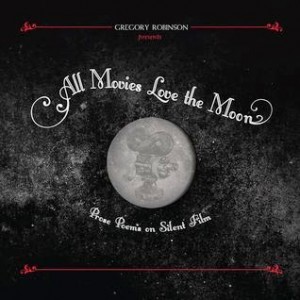 All Movies Love the Moon: Prose Poems on Silent Film
All Movies Love the Moon: Prose Poems on Silent Film
By Gregory Robinson
Rose Metal Press, March 2014
96 pages / $14.95 Buy from Rose Metal Press or Amazon
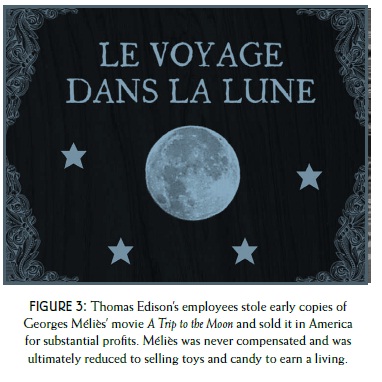
“In 1894, Fred Ott sneezed. Thomas Edison’s cameras were there to transform the event into a motion picture, appropriately named Record of a Sneeze,” So begins moving pictures, and Gregory Robinson’s brilliant new meditation on silent film, All Movies Love the Moon, out now from Rose Metal Press. In this work, he juxtaposes frames from silent pictures with musing prose poetry. He explores works by the Lumière brothers, Georges Méliès, and Fritz Lang. Just the filmography he provides is fascinating, especially if you’re like me where these films have always chiefly evoked classic Smashing Pumpkins music videos: Méliès (Tonight, Tonight) and Lang (Stand Inside Your Love).
Like Simic’s treatment of Joseph Cornell, Robinson brings a poet’s eye to the project. He employs information,misinformation,history, and histiography; and the result is often very funny, offering up strange errata and juxtapositions.
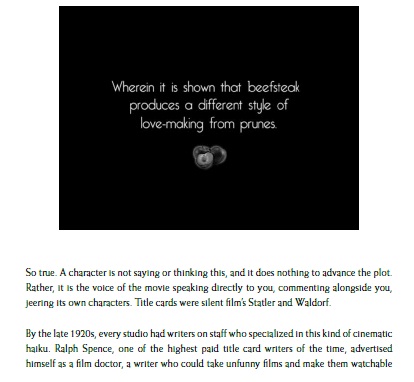
He tells the story of Ralph Spence, a “film doctor” responsible for taking unfunny early films and making them watchable, by writing witty title cards. READ MORE >
July 25th, 2014 / 10:00 am
Juliet Escoria & Scott McClanahan’s Honeymoon Tour Diary (Part 2)
WEDNESDAY, JULY 9 2014
DENVER TO OMAHA
SONG OF THE DAY: NEIL YOUNG “GIRL FROM THE NORTH COUNTRY”
SCOTT: I liked driving through Nebraska because I’m a big Willa Cather fan. This was our loooooong day of driving and we were in the car for 9 hours. I think we both got a small case of what truck drivers and bikers call “monkey butt.” Definition?
Monkey Butt (noun): When the back parts of travelers get permanently red and give off a strange odor that attracts wild animals.
We also almost ran into a tornado during the middle of the day. The storm turned over a couple tractor trailers along the highway and we started getting nervous about tornados and being carried away.
We saw a rainbow in the distance and we started calling it “the rainbow of doom.” Rainbows are mean as shit. Our conversations about the rainbow of doom sounded like this.

This rainbow looks friendly but it is actually a stone-cold killer.
I don’t have anything else to say about Wednesday.
UPDATE: Two hours after emailing Juliet my Wednesday section of the tour diary this happened.
Hardly Getting Over It: A Review of See a Little Light
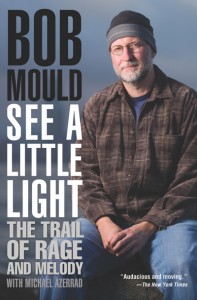 See a Little Light: The Trail of Rage and Melody
See a Little Light: The Trail of Rage and Melody
by Bob Mould with Michael Azerrad
Little, Brown and Company, June 2011
416 pages / $24.99 Buy from Amazon
Why would anyone expect the ex-member of a famous rock band—those fertile dens of back-stabbing, girlfriend stealing, passive-aggressiveness and all around hurt feelings—to offer a healthy recounting of his time in said band? It’s like asking a combat veteran to empathize with the people who shot at him.
Yet, for those rock artists we truly admire, we crave that kind retelling. They’ve blown our minds so many times in the past with their transcendent work. If we’re disappointed they can’t deal with their issues enough to tell their band’s story in a fully-realized way, it’s only because we’ve learned to expect that much from them.
I skipped reading Bob Mould’s autobiography See a Little Light: The Trail of Rage and Melody (Little, Brown) after hearing Mould was less than resolved about his time in the formative post punk band Hüsker Dü, and in particular with his relationship with drummer/songwriter Grant Hart. I was a big Hüsker fan in the eighties and nineties, and I’d identified closely with Mould’s rage on classic albums like Flip Your Wig, Zen Arcade and Warehouse: Songs and Stories. I’d fallen away from his work around the time of his last album as the frontman of the band Sugar, and steadily found myself less interested in him as the years passed. The singer was so associated with the blood-curdling screams he’d let loose during his Hüsker years, I preferred to think of him as conquering his fury, moving on to better things, getting over it. Yet here was Mould, supposedly getting thorny about Hart and bassist Greg Norton in book form. Not interested.
But those who skip See a Little Light for these reasons will miss much of a story that few but Mould can tell: of Hüsker’s beginnings and ascendency, of the nascent eighties hardcore subculture in America that would lay the groundwork for the massive grunge movement in the nineties, not to mention refreshingly candid insights into Mould himself, one of his generation’s most conflicted icons.
Mould didn’t get riddled with rage by happenstance. His upbringing in rural upstate New York with an alcoholic, abusive father was plenty turbulent, and discovering his homosexuality in adolescence only further alienated him from those he grew up with. Most harrowing to me was when Mould was eighteen and for the first time away at college in St. Paul, Minnesota, trying to find his place in a confusing world. Not only were they stringing up homosexuals like deer back in his hometown, but, Mould writes, “the weekly phone calls with my family were difficult enough, especially the ones where my father threatened to sever my financial support or escalate his violence toward my mother.” I can only imagine a young, scared Mould desperately needing to make urban Minnesota work for him, knowing he had no home to go back to.
July 21st, 2014 / 10:00 am
Green Lights by Kyle Muntz
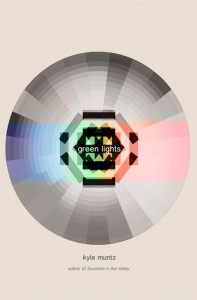 Green Lights
Green Lights
by Kyle Muntz
Civil Coping Mechanisms, May 2014
108 pages / $13.95 Buy from Amazon
In Kyle Muntz’s Green Lights, we’re exposed to wavelengths as beams of prose, an unnamed narrator whose world is flooded in the disparate hues of existence. There’s a meditative quality throughout, a detachment borne of Kafkaesque inquiry and a yearning for communication that teeters on the fiat lux’s of every day creation. Not just through visible light, but the invisible nanometers that escape normal sight. “I want to talk about color,” the book begins, and the colors of the spectrum quickly become a metaphor for revelation and metamorphosis. The characters, from the moon turned into a woman, to an old man embodying evil, become symbolic accoutrements for the journey which turns out to be an excursion to another dimension. Elements of the fantastic shine as in the “Blue” chapter when the whole neighborhood is covered in noirish film shades that masquerade as night, and then, “The world froze… Ice had taken over the world.” Winter isn’t just the congealing of the veins and muscles, but a coat of futility wrapped around his routine actions. “After much effort, I thawed my room. I’m not proud of the things I did to accomplish this,” he confesses, then further reveals, “I got a job carrying a flamethrower around the neighborhood, melting people. My coworkers treated me like shit.” The frost of survival is just as bleak as the cold treatment of his colleagues and the blending of colors weaves the conflagration of pain with the inferno of transformation.
There’s a melodic beat to Muntz’s writing, terse descriptions of events interspersed with sudden bursts of graphic visuals, often macabre in its evocations. It’s a delicate balance, but one he masterfully navigates, exploiting minimalism to maximize emotional defibrillations, injecting the grotesque to animate the mundane:
“One time when I was walking in the darkness, I stumbled over something, and it was him, sprawled on the ground, unable to move. He didn’t have eyes anymore. Maggots crawled amidst the remnants of his skin, fibrous muscles like totted spaghetti. Worms fucked his intestines. Beetles were chewing his brains.”
Like signal lights, there’s a revolving flow of ideas that are given free rein and then brought to a halting stop, warning yellows demarcating the blurry boundaries between illusion and reality. That border is often where Muntz’s narrator lingers, rarely surprised by the absurdity of the surreal events that happen around him, instead, levitating past the barriers. It’s almost as though the green light were always on and physics broken free of limitations to innovate. Muntz revels in experimentation, relishes the opportunities to change up the traditional narrative as he bakes x-rays of playful contemplations into the atlas of his construction:
“Sometimes when I looked into the distance, I remembered that the darkness I could see there was actually the mountain, holding up the base of the universe. If I were to walk that way, the neighborhood would never end, but eventually it would become less real… The road continued even where the world began to change colors.”
His main companion is his love interest, E, who is as curious as the narrator about the frontier, a geography that challenges the intellectual as much as the physical. Both are intertwined and both affect each other, a symbiotic terraforming that is volcanic in its effect.
“Nearby, behind an abandoned house, we found an immense flower growing from the ground. The flower was at least a hundred feet tall. Beads of water clung to its sides… She nodded. ‘It looks like a picture of itself, meaning it looks better than real. That means something. It implies amazingness.’
‘Should we climb it?’
‘Probably,’ she said. ‘If we didn’t, we would feel bad about it later.’”
There’s a lot of climbing in Green Lights and like E, we know we’d feel bad if we didn’t venture upward. Along the way, we get dashes of the videogame classic, Earthbound, embedded with David Lynch, Borges, and doses of Marquez. The combination acts as a variety of hues to assault our senses in this quirky and likable hike while at the same time, Muntz weaves his own identity through the narrative. I just wish there were more colors in the spectrum.
***
Peter Tieryas Liu is the author of Bald New World and Watering Heaven. He entropies at entropymag.org. He loves green lights. And red ones. And blue ones too.
July 21st, 2014 / 10:00 am
Andrew Duncan Worthington Interview

Tamped-down rage never quite enunciated hums quietly beneath the surface of Andrew Duncan Worthington’s debut novel Walls, a new release from Civil Coping Mechanisms. Narrated by a twenty-something Ohioan, Walls strings together banal humiliations, flat-footed conversation, shitty jobs, and shittier sex to create a convincing tableau of millennials marooned in boredom. Worthington is also a founding editor of Keep This Bag Away From Children. Recently, we talked shop over G-Chat because we were both born after 1980.
—-
Tracy O’Neill: You begin Walls with a lengthy history of a failed building project. We find out by page three that this description is spoken by a tour bus guide. In some ways do you see the novel as a tour of a failed project, and if so, what is the failed project?
Andrew Worthington: I hadn’t really thought of that, in terms of the novel being a tour of a “failed project.” I did want “Ohio” or “northeast Ohio” to be a character, in a way, though, in the sense of it being ever-present almost as much as the main character. The main character as a failed project? I don’t know. But that character of “Ohio” is a failed project. It’s not its fault, though. It was just a body of land that people moved to because they couldn’t have enough land somewhere else. Ohio embodies, for me, the most extreme but also the most mundane aspects of what is wrong with the United States. I’m getting off your point, I think. Maybe if you told me what you mean or think, that would be easier.
TO: What do you think is wrong with the United States?
Eternity by the Stars: An Astronomical Hypothesis
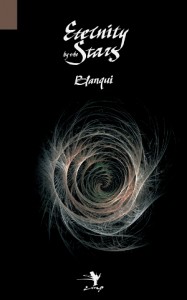 Eternity by the Stars: An Astronomical Hypothesis
Eternity by the Stars: An Astronomical Hypothesis
by Louis-Auguste Blanqui
Translated by Frank Chouraqui
Contra Mundum Press
202 pages / $20 Buy from Amazon or Contra Mundum
Eternity is a concept rather dubiously tough to wrap the mind around. Throw in the idea of duplicate worlds and simultaneous events with differing end results, replicating yet infinitely fracturing the day-to-day reality we recognize as “the real,” and the average reader’s head begins to spin. While these matters are not always tidily handled within Louis-Auguste Blanqui’s Eternity by the Stars they are dealt with utilizing a fair amount of pith.
Blanqui after all was a ubiquitously engaged nineteenth century French revolutionary thinker and “man of action” who wrote this book from May to November of 1871 while under constant threat of armed guard in a heavily fortified jail on a small, rocky island just off the coast of Morlaix where waters of the English Channel mix with the Atlantic Ocean.
Translator Frank Chouraqui’s introduction provides orientation concerning the biographical details behind Blanqui’s work while also marvelously untangling some of the thornier scientific scenarios presented in his argument. There are two key scientific authors whose work and ideas Blanqui cites, often contentiously: Pierre-Simon Laplace and Francois Arago. Chouraqui irons out the creases in Blanqui’s presentation of each author’s argument in relation to his own.
The science passages in Blanqui’s text are among the most challenging material for unfamiliar readers. Having Chouraqui’s lengthy introduction to refer back to along with the endnotes he provides to the text are of enormous assistance, as is his extrapolation upon the clear relevance of Blanqui’s writing to the work of Walter Benjamin, Jorge Luis Borges, and Friedrich Nietzsche.
In and out of trouble with French authorities most of his adult life, Blanqui fought his way through numerous ups and downs accompanying several frequent changeovers within the government throughout his lifetime. These were a series of political changeovers which both in his writings and actions he did his best to ferment. Imprisoned inside Fort du Taureau (Castle of the Bull) Blanqui conceived of and wrote Eternity by the Stars while awaiting his trial, insisting that the text was an integral part of his defense.
Chouraqui describes how, locked up in the island prison, “Blanqui found himself surrounded by a world of repetition.” Confronted by such a situation, Blanqui laid out an argument for the prevailing destiny of everything in the universe that would serve to counter the frustration he felt, as Chouraqui describes it: “The main claim of Eternity by the Stars is that the discrepancy between a limited — albeit great — number of possible events and the infinity of time and space necessitate the infinite repetition of all possible events.”
July 18th, 2014 / 10:00 am
Juliet Escoria & Scott McClanahan’s Honeymoon Tour Diary (Part 1)
SUNDAY, JULY 6
SAN DIEGO TO LAS VEGAS
SONG OF THE DAY: ELVIS PRESLEY “I CAN’T HELP FALLING IN LOVE”
JULIET: We packed up my stuff in the car, said goodbye to my family, and were on the road by 2pm. We stopped for food and gas in Elsinore. I decided that it would be a good idea to buy a pack of cigarettes (I quit smoking in November and haven’t had a cigarette since) and smoke one for every state we went through, in order to “celebrate our honeymoon.” As we drove, we listened to the mixes we made for our wedding. Most of the drive involved us discussing funny moments from the wedding. EXAMPLE: My dad apologized to Kendra Grant Malone for being so drunk. Kendra told him not to worry about it. My dad responded, “Power to the people.”
At some point, things took a turn for the worse. We passed the word “Calico” all big on the side of a mountain, which I’m not sure is a town or a street or a gang, but the conversation shifted to all the calico kitties pushing those rocks together with their paws. New characters were invented, such as Man Who Thinks It’s Still 1989 Politically and Woman Who Becomes Belligerent When She Sees Red Honda Accords.

Plate of stick-shaped items from buffet
We arrived in Vegas around 8pm. Our hotel room featured two bathrooms, a Jacuzzi bathtub, a shower with three showerheads, a fireplace, a dishwasher, etc. Everything was modern and sleek looking, to the point that the room felt vaguely terrifying and everything was difficult to use. I went on the computer to find a good buffet for Scott and me to eat at, because we had decided we wanted to eat until we felt sick. I found two ones that looked really good but that would have required us to walk so we ended up deciding to eat at the buffet at our hotel even though it had bad reviews on Yelp. The buffet was, as expected, mediocre. I ate one oyster anyway, even though I was afraid it would give me food poisoning (it didn’t). Scott drank five Diet Cokes.
We took a short walk afterward in order to feel slightly less fat, but didn’t get very far because it looked like it might start pouring rain (it didn’t). On the way back, we saw a very tall but handsome foreign guy walking arm-in-arm with two prostitutes. We discussed the nature of prostitution, and how it differed from stripping. It was concluded that prostitution was more honest and therefore in some ways more honorable. Scott seemed to know a lot about prostitutes, which troubled me.
At the hotel, I took a bath in the Jacuzzi bathtub. The tub was very large and oddly shaped and it made me feel like a lobster. I enjoyed the bath, and my lobsterness.

Juliet’s lobster bath
SCOTT: Yep.
